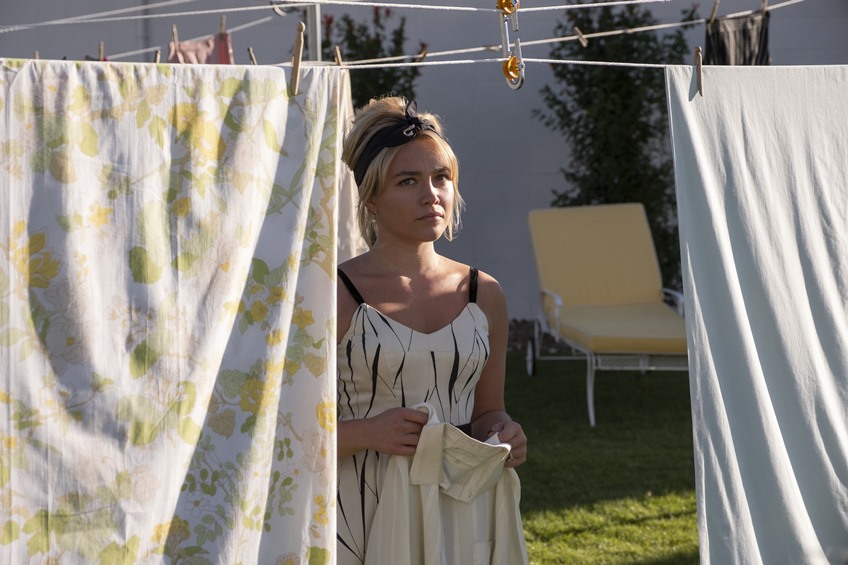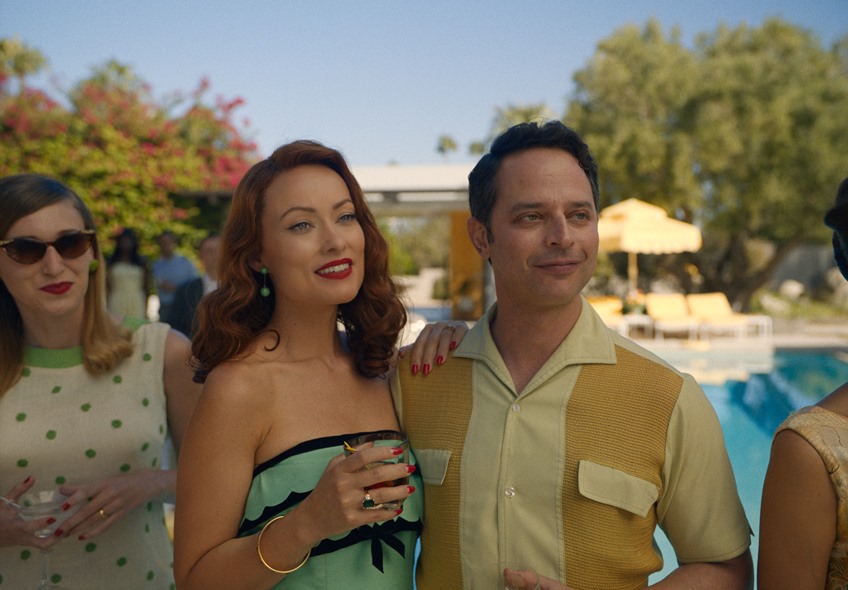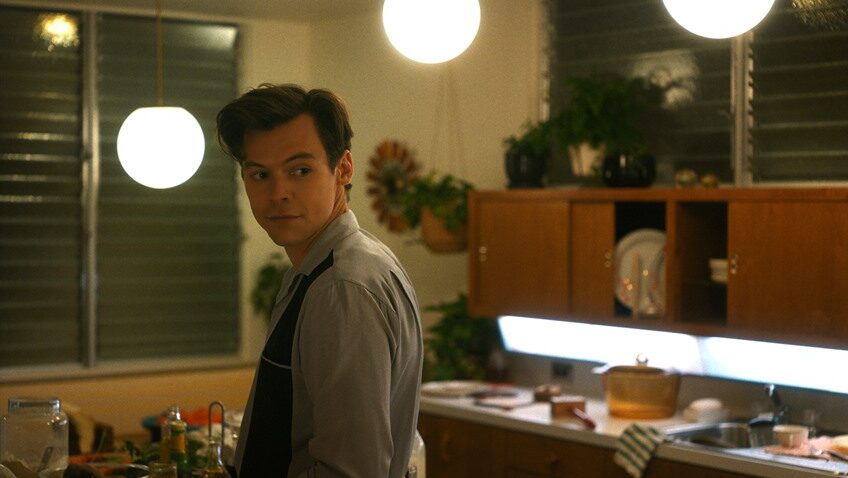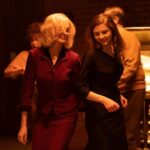Joyce Glasser reviews Don’t Worry Darling (September 23, 2022) Cert 15, 122 mins.
The 15 certificate may disappoint Harry Styles’ younger fans in his feature film debut, but a major sex scene – in which Styles’ Jack Chambers makes passionate love to his wife over the piping hot, gourmet platters on the dining room table, makes sense in the context of a film that looks good enough to eat. That little else makes much sense is one of the problems with Olivia Wilde’s new film (after her acclaimed directorial debut, Booksmart) Don’t Worry Darling.
Wilde, with the help of cinematographer Matthew Libatique (Darren Aronovsky’s regular) set designer Rachael Ferrera and the art and costume departments, conjures up a parody of a 1950’s suburbia between Stepford Wives and The Truman Show, and then throws in the disturbing family doctor, Dr Collins (Timothy Simons), for a touch of Rosemary’s Baby. It’s only in the second half when we get a touch of Christopher Nolan and David Cronenberg that things begin to unravel.
That the eponymous “Darling,” Jack’s pretty, curvaceous wife Alice (Florence Pugh), isn’t worried about her plastic, regimented life until the second half of the film is a miracle. For even if the setting is the 1950s, rather than a cult cloning of 1950s suburbia in the 21st century, you’d think the stay-home wives in the purpose built town of Victory would be worried.

Every morning in the Chambers’ cul-de-sac of spacious ranch houses, all the husbands leave for work at the same time in their cute sports cars or sedans and, like an army regiment, drive across the desert to an artificial mound on top of which is a domed structure, like a research lab built on the top of a volcano.
This is the home of the Victory Project credited by founder Frank (Chris Pine) with “changing the world.” Jack, who identifies as an electrical engineer, and all the male residents of the cul-de-sac, work inside, although we never find out what they do.
Nor do the wives, as the husbands are forbidden from discussing their top security work with family. The wives’ work is housework. The house must be spotless and laundry is always drying in the sunshine. The women shop, take a ballet class, make cocktails for an afternoon gossip by the pool, cook dinner and wait at the door, all dressed up, for their husbands to return punctually.
You can’t get the New York Times; and we don’t hear any US or international news on the TV or radios, begging the question just what do the couples talk about between themselves and at social gatherings? This brings us to the 15 certificate.
Since there is nothing to talk about, sex fills the emptiness, although their sexual attraction is genuine. Being childless has strengthened the bond between them, making what happens later all the more puzzling, or tragic.
And if an opening party is anything to go by, the couples drink themselves silly, perhaps to numb the boredom. That we are not bored is down to Florence Pugh’s magnetic performance, Wilde’s direction and the colourful set and costume design. And of course, we are sizing up Harry Styles whose role, while not demanding still needs more than he can give, particularly to avoid fading away next to Pugh.

Wilde also plays Bunny, a Victory wife with two children and Alice’s best friend. It turns out that she knows more than she is telling, but for the sake of her children (who would otherwise not be with her), she plays along with the creepy, sinister Frank. This gradually changes but just when the action picks up and women start getting curious, the script (from a story by Booksmart’s Katie Silberman and a script by Carey and Shane Van Dyke, Dick Van Dyke’s grandchildren) begins to lose its way, and us.
It all begins when Alice breaks an egg and realises there is nothing inside. Then Alice rides the bus to the end of the line as she has done all her shopping and has never been at the edge of the desert. There, suddenly, she sees a small plane fly into the Victory Project mound and disappear. The bus driver pretends he did not see the incident and refuses to investigate, afraid of the consequences of breaking the rules. Alice goes on foot.
Thereafter she begins to suffer from hallucinations (a recurrent circle of Busby Berkeley dancers crossing their long legs and feels trapped between the glass in her home. At a gathering, Victory’s only black woman, Margaret (KiKi Lane), asks, ‘Why are we here?’ to a horrified silence. There is talk that her husband will be sacked. But later, when Alice sees Margaret commit suicide and tells Adam, they are assured by Dr Collins that Margaret is getting medical and psychiatric help.
When Alice starts asking questions and she, too, is diagnosed with “hysteria,” the tension mounts, culminating in an anticlimactic showdown with Frank, designed to expose him in front of guests. But (and here viewers will find political analogies), the guests are reluctant to trade in their perfect lives for a hysterical woman’s truth.
There are more questions and loopholes than you can shake a cat at in Don’t Worry Darling including why Styles suddenly breaks out in a puppet-like dance on stage when given a promotion and what the plane was doing. Like Booksmart, this is a story of female empowerment, but one in which the subjugation of women takes centre stage.




